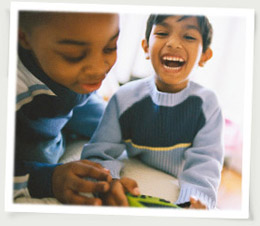
Building your child's self-esteem
Part 1 of 4
Posted in General Health & Wellness on July 25, 2013. Last modified on April 02, 2019. Read disclaimer.
Have you ever wondered what makes some children so full of life and others so out of it? Why is one child friendly and out-going while another is shy and withdrawn? Part of the answer has to do with how a child feels about himself -- his self-esteem.
+ Free Shipping & Returns on Eligible Items.
(*Amazon's Top 100 list updated hourly.)
Self-esteem is about feelings. Feelings are important. They influence just about everything we do. Building your child's self-esteem means building your child's feelings that he is okay. If your child feels good about himself -- has good self-esteem -- then he is confident, free to take chances and make decisions and able to laugh at his mistakes.
If your child doesn't feel good about himself -- has poor self-esteem -- then he lacks the confidence in himself to take risks. He may be reluctant to try something new, find it hard to admit his own mistakes and may feel that there is nothing he can do to improve himself.
If your child is put down a lot and told he will never amount to much, he will not feel good about himself. All children need praise, constructive criticism offered kindly and reassurance about their abilities. What you tell your child makes a big difference. To help develop a healthy self-esteem in your child, remember that his first need is to be liked, accepted and valued by you and especially by himself. You have to like yourself if you are going to help your child like himself.
Let's look at some common mistakes that parents make. Parents may yell at or ignore a child, or they may call him names. Often they say or do things that they regret later. Sometimes the mistake is more subtle. Some kids try very hard to do what is expected of them, but, in some way, just don't measure up. They cannot keep up with the neighbor's child, a friend or a brother or sister. Parents push them into activities they don't like. Parents sometimes bribe kids. They enroll them in music classes when the children have no musical talents or interests, and then the child is compared to other children. It's no wonder when self-esteem reaches a low point. These children have a "not-so-good" feeling. As a result, they become upset, easily frustrated and disappointed.
Parents sometimes add to a child's bad feelings by using put-downs. "You're just like..." "You never do anything right." "Why can't you be like...." Put-downs are a sure way to tear down your child's self-esteem. Each time your child hears a putdown, he pulls a little deeper into his shell and becomes less trusting of himself and others.
Now that you have an overview of self-esteem, let's look at what can be done to build healthy self-esteem in infants and toddlers, preschoolers, how best to support school-age children and teenagers, and support and tips for parents.

 Whole Grain Cooking Guide
Whole Grain Cooking Guide Avoiding and Treating Bug Bites
Avoiding and Treating Bug Bites Plastic Water Bottle Safety Concerns
Plastic Water Bottle Safety Concerns Should Everyone be Eating a Gluten-Free Diet?
Should Everyone be Eating a Gluten-Free Diet? Healthy Foods: Pomegranate
Healthy Foods: Pomegranate Tips for Building a Child's Self-Esteem
Tips for Building a Child's Self-Esteem Helping Your Child Succeed in School
Helping Your Child Succeed in School Potential Benefits and Dangers of Raw Milk
Potential Benefits and Dangers of Raw Milk How Many Calories are Burned Doing Everyday Activities
How Many Calories are Burned Doing Everyday Activities